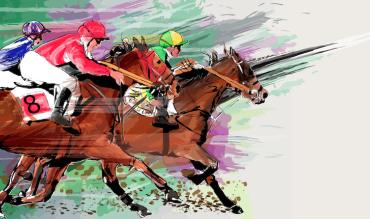From blackjack in the Nevada desert to algorithms in the skyscrapers of Hong Kong, Bill Benter didn’t gamble – he calculated. And in doing so, he became the richest professional gambler in history.
Who Is Bill Benter?
Bill Benter is an American professional gambler, software developer, and philanthropist who transformed the gambling world by creating the most successful horse racing prediction algorithm in history. While most people go to the racetrack hoping to get lucky, Benter showed up with a computer and walked away with hundreds of millions, eventually becoming a billionaire.
Born in Pittsburgh in 1957, Benter studied physics and philosophy at Case Western Reserve University but left before graduating. Instead of pursuing an academic career, he applied his mathematical talents to gambling.
Starting with card counting in Las Vegas, he evolved into a pioneer of algorithmic horse racing and eventually built an empire that continues to influence the gambling, tech, and finance industries today.
“There’s a fine line between gambling and investing,” Benter said. “We just ran our numbers better than the next guy.”
Throughout this piece, I aim to paint not just a profile, but a deeper narrative, a kind of character study of one of the most analytically brilliant and elusive figures in modern gambling history.
If this article interests you, keep reading. Alternatively, explore other topics like blackjack side bets and roulette strategy.
From Card Counting to Code: How Bill Benter Made His Money
Blackjack Beginnings (Las Vegas)
After university, Benter began his gambling career in Las Vegas casinos by mastering card counting techniques popularized by Edward Thorp. For seven years, he consistently beat the casinos using statistical edges.
Though eventually banned from most casinos, he walked away with more than experience – he had learned card counting blackjack strategy, bankroll management, risk control, and the discipline needed to exploit small advantages at scale.
“We didn’t beat the races overnight,” Benter said. “It was more like a machine learning problem that took 20 years.”
Algorithmic Horse Betting in Hong Kong
In 1984, Benter took his $150,000 bankroll and moved to Hong Kong, teaming up with fellow gambler Alan Woods. They started building data models to try and beat the Hong Kong Jockey Club horse races.
Initially modest in returns, the model matured rapidly. By 1988, Benter had made $600,000. In 1989, he cleared $3 million.
Over the next decade, Benter refined his algorithm to include over 130 variables – each applied individually to every horse in a race, from weather conditions and track speed to jockey performance and bloodline.
The system used the Kelly Criterion for optimal bet sizing and, at its peak, was generating over $100 million annually across syndicate-managed accounts.
Benter’s edge came from calculating the true odds of each horse — not relying on the bookmaker’s prices. If a horse was listed at 3-1 (25% chance), but his model showed a 33% chance (closer to 2-1), he’d bet. That gap between market odds and statistical reality was where his profit lay. By backing only those horses where the odds were in his favour, Benter turned small mispricings into consistent, long-term gains.
His biggest theoretical win came in 2001, when his model successfully predicted a Triple Trio (a near-impossible wager requiring the top three finishers in three consecutive races). The ticket was reportedly worth HK$118 million (estimated at approximately £12 million), but Benter chose to leave it unclaimed to avoid attention.
Picking the first three horses in three consecutive races has odds of about 1 in 48 million. It’s nearly impossible for casual bettors, but Benter cracked it using data and algorithms. His ability to beat the system helped build Benter’s net worth, now estimated between £1–2 billion – cementing his legacy as the most successful professional gambler in history.
Imagine placing a bet worth millions and then walking away without ever cashing the ticket. That moment alone captures the essence of Benter's mindset: calculated, unemotional, and strategic to the last decimal point.

Business Ventures & Investments
Benter didn’t just stop at gambling. He diversified into:
- Acusis LLC: As Chairman and International CEO, Benter leads this Pittsburgh-based medical transcription and data services company, founded in 2001.
- Real estate & global investments: His portfolio includes properties in Asia and the UK, along with a diverse mix of traditional investment vehicles.
- Quantitative finance consulting: Benter is often credited with pioneering techniques now foundational to algorithmic trading. He consults for financial institutions looking to replicate his statistical betting strategies in financial markets.
Academic Contributions
Benter shares his insights through lectures at prestigious institutions including the University of Southampton (as a visiting professor), Harvard, Stanford, Carnegie Mellon, and the Chinese University of Hong Kong. His topics cover risk management, statistics, and the intersection of math and economics.
Bill Benter Net Worth
So, what is Bill Benter's net worth? Estimates vary, but most credible sources agree it sits between £1–2 billion. The wide range reflects the private nature of his finances and the difficulty in valuing his diversified holdings.
Breakdown of Wealth Sources:
- Horse racing profits: Estimated at approximately $100 million per year at peak.
- Business ventures: Ongoing income from Acusis and other companies.
- Investments: Traditional assets and stock portfolios.
- Real estate: Properties in the UK and Hong Kong.
- Consulting: High-value advisory roles in finance and technology.
Personal Life: Private, Purposeful, Philanthropic
Benter is married to Vivian Fung, a Hong Kong national. The couple wed in a Tibetan Buddhist ceremony in March 2010 and have a son, Henry, born in 2015. They split their time between Hong Kong and the UK.
Though known for extraordinary gambling acumen, Benter avoids the spotlight. He is described by peers as cerebral, methodical, and modest. His departure from gambling was as calculated as his entry. He retired gradually, eventually ceasing all major bets after 2001.
Inside Asian Gaming noted: “He wasn't solely motivated by money.”

Lifestyle, Friends & Habits: The Anti-Gambler Gambler
Unlike the stereotypical high roller, Bill Benter is more Silicon Valley than Las Vegas. He reportedly lives a modest life despite his wealth, favouring tailored suits and simple but elegant attire when appearing in public. His preferred clothing style reflects his analytical, understated personality: classic, unfussy, and functional.
Cars & Residences
While not known for owning flashy cars, Benter has been seen in practical luxury sedans in Hong Kong and the UK. He reportedly owns:
- A discreet apartment in Hong Kong’s Mid-Levels area.
- A classic townhouse in the UK, near the city’s tech and university corridors.
Diet and Dining
There is no known record of a specific culinary preference, though colleagues describe him as someone who enjoys quiet, quality meals with close companions over lavish dining. He has been seen at private member clubs and exclusive but low-key restaurants in Hong Kong.
Famous Associates
Through his Hong Kong betting days and statistical work, Benter formed a close early partnership with Alan Woods, the late Australian gambler. Though their business relationship ended, they shaped modern betting together.
Other associations include:
- Edward Thorp: Indirect mentor through blackjack.
- Charles Barkley (rumoured acquaintance during Vegas years).
- Various academic collaborators: Particularly in Hong Kong and the UK.
Though not a socialite, Benter is connected through philanthropy and academia to political and business leaders across the US and Asia.
The Benter Foundation: Quiet Wealth, Loud Impact
Founded in 2007, the Benter Foundation channels his wealth into philanthropy focused on education, public health, the arts, and economic development, particularly in the UK.
Key initiatives:
- Education: A $1 million scholarship to Carnegie Mellon University for math students.
- Literacy: $250,000 to Dolly Parton’s Imagination Library to boost early literacy.
- Urban renewal: Supports restoration projects including the lobby of Pittsburgh’s historic stock exchange building.
- Health & arts: Donations to local hospitals and arts institutions.
- Global health: $3 million donation toward worldwide immunisation efforts.
Bill Benter’s Legacy: The Man Who Turned Horse Racing into a Math Problem
Who is Bill Benter? He's the man who made billions by treating horse racing like a data science problem. He didn’t get rich by being lucky, he did it by being right more often than the market.
Benter’s story isn’t just about gambling. It’s about using math to create value, taking a system most believe is unbeatable, and proving them wrong through intellect and persistence.
His legacy reaches far beyond the racetrack. Benter is revered in gambling, respected in academic circles, and admired in philanthropy. In many ways, his quiet influence continues to shape how we think about risk, reward, and how far raw intelligence can take you.

What You Can Learn from Bill Benter
- Systems beat hunches.
- Patience is a long-term edge.
- You don’t have to be loud to win big.
- Private wins often outlast public fame.
The Hidden Pattern: How Benter Foreshadowed the AI Era
What Benter achieved in the 1980s and 90s, using large datasets and statistical models to predict racing outcomes, closely mirrors how today’s AI operates.
If you're asking who Bill Benter is, he was applying machine learning principles decades before the term became popular. His system was so effective that the Hong Kong Jockey Club eventually banned him from placing bets, just as Las Vegas casinos had banned him for beating them at blackjack.
But even after being shut out, he still won. That’s the hallmark of a true systems thinker: when your edge is built on logic, not luck, the results speak for themselves. With an estimated Bill Benter net worth between £1–2 billion, his legacy proves that in horse racing, as in life, the smart money is always on math.


